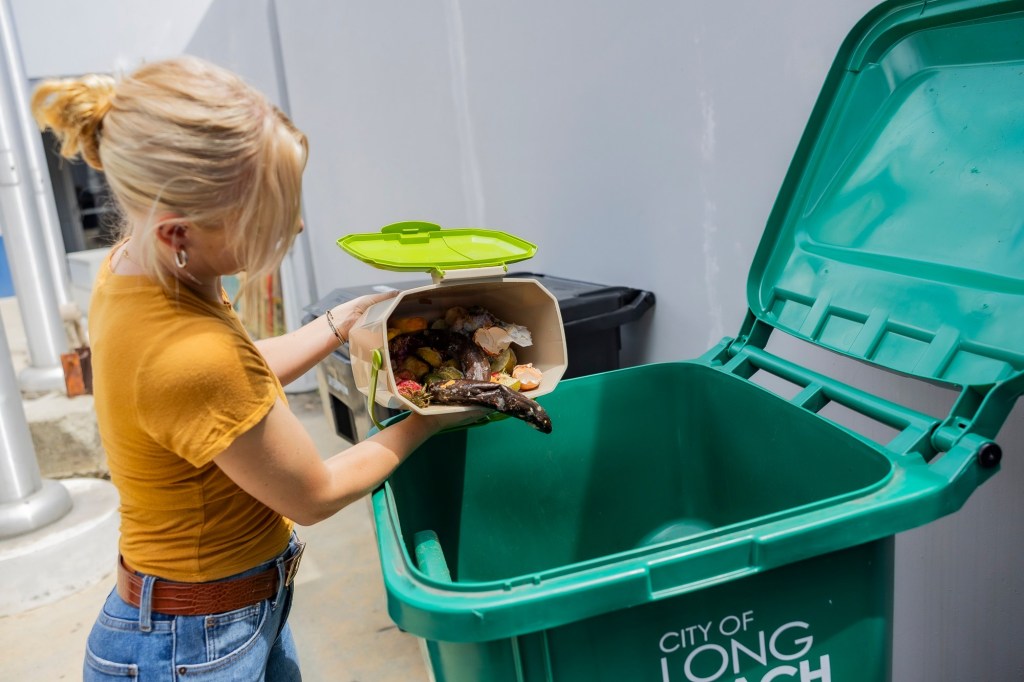Long Beach has been slowly rolling out its organic waste collection program across the city for the past year, but has already run into some challenges that the City Council wants to begin addressing — to ensure residents receive adequate service.
City staffers will return to the council in two weeks with a status update on the program and a plan to address ongoing constituent concerns related to missed collections, availability of carts for exchange requests, and customer service satisfaction.
Fourth District Councilmember Daryl Supernaw brought the item forward to his colleagues and staffers this week, as residents in the district have concerns over the program.
Over the summer, District 4 residents received green carts, yet collections are not consistent, Supernaw said. Information regarding the status of the program and efforts to address deficiencies has been unclear. Supernaw, with council support, has asked for a presentation to provide information and context regarding this issue, including about the shortages of all replacement carts and customer service response, among others.
Councilmember Kristina Duggan also said that residents in the Third District are having similar issues.
“I know that residents are frustrated with the state over this unfunded mandate; they put this on the city, but we have had years to plan for this waste collection program,” Duggan said during this week’s council meeting, “and my concern is we’re not treating this with the urgency that we need to.”
The city has been working to implement the state’s Short-Lived Climate Pollutant Reduction Strategy bill, SB 1383, for several years, according to city staff. The mandate requires local jurisdictions to implement and enforce organics waste collection and edible food recovery programs, among other measures.
Long Beach began a phased approach for its residential organics collection program rollout a year ago for the 19,000 single family and multifamily homes it serves. The first phase had more than 8,000 homes that began having to properly dispose of their organic waste. In June, the city continued expanding the program to meet state requirements by providing organics collection services for all remaining residents receiving city refuse service by the end of this year.
In a city memo released on Tuesday, Oct. 7, acting Director of Public Works Joshua Kickman and Director of Energy and Environmental Services Bob Dowell provided an update on the roll out of the organics collection program and highlighted the city’s efforts to address some of the implementation challenges.
Long Beach has had a comprehensive education and outreach program that started prior to the launch of the first phase in October 2024 — and continuing through 2026 — to educate residents on how to ensure proper use of refuse, recycling and organics carts, according to the city memo.
The transition to residential organics collection required a complete update of all previous trash routes, as each route is based on tonnage, number of stops, travel time between stops and other factors impacted by the new program. As the community adapts to the new green carts and the program stabilizes, there will continue to be changes to the routes, city staff said, and the team will continue evaluating routes and adapting as necessary to fill operational gaps.
As for the availability of carts for exchange requests, the memo said that the city has run out of the 35-gallon and 65-gallon carts. New refuse carts are expected to arrive in November, at which time refuse cart exchanges will resume.
The city has tried to address some of the challenges with the program, city staffers said. In 2023, for example, the city planned to acquire 20 replacement vehicles and 25 new collection vehicles to support the organics program — but the city only received nine in April. The remaining 16 vehicles are now anticipated to arrive later this month and be put into service in November. To reduce potential service interruptions caused by the delay, the department secured six rented electric vehicle mini-packers to ensure operational capacity.
Historical refuse collection data indicates an average missed collection rate of 0.63% citywide, according to the memo. Over the last three months, however, the rate has increased to 0.91% for refuse collection and is currently 0.80% for organics, which is attributed to operational challenges associated with the new program, new routing, new technology, new staffing and vehicle delivery delays.
City staffers said they are committed to continuous improvement and are actively using community feedback to refine the processes and ensure “service excellence for all residents.” To date, more than 7,600 tons of organic material have been diverted from landfills, and the fourth and final phase of the program rolls out this month.
The Long Beach City Council will also continue discussing the program and challenges during its meeting on Tuesday, Oct. 21.
Originally Published: October 10, 2025 at 11:14 AM PDT

